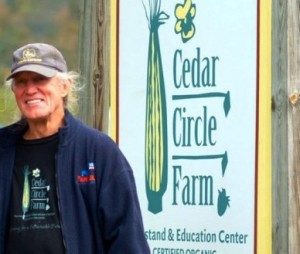VT organic farmer and GMO expert: Labels ‘like skull and crossbones’

LABELS SAVE LIVES: Organic farmer and GMO expert Will Allen says labeling laws will end the sale of genetically engineered foods in Vermont and across the United States.
By Bruce Parker | Vermont Watchdog
Will Allen is not just an organic farmer — he’s an expert.
As the head of Cedar Circle Farm, Allen brings a lifetime of sustainable farming experience to the 40 acres of vegetables and berries that line the Connecticut River in East Thetford, Vt., on land conserved by the Vermont Land Trust.
A professor and activist, Allan’s bio features many credentials, from founder of the Sustainable Cotton Project and the California Certified Organic Farmers Organization to policy adviser to the Organic Consumer Association. If all goes according to plan, Allen may soon add a new credential to the list: litigant in Vermont’s multimillion-dollar GMO lawsuit with the Grocery Manufacturer’s Association.
So when Allen speaks on the impact of GMO labeling on food manufacturers, people listen.
“They’re worried about skull and crossbones on food labels, because that’s what they think is going to happen as soon as you put a genetic engineering label on it — it’s like a skull and crossbones,” Allen told Vermont Watchdog.
According to the Thetford farmer, GMO labeling laws could end the use of GMOs in the United States.
“(Here’s) what will happen if the labeling bill passes a court challenge. That law will go into effect in 2016, and at that point, I’ll guarantee you, that as it happened in 64 countries that have labeling already, the genetic engineering industry will switch products, because they know a GMO label is driving people away from buying that food.”
Allen is among the true believers who say genetically modified organisms are dangerous and should be labeled as such. He organizes an educational center at Cedar Circle Farm that coordinates outreach to Vermont schools, and he proudly tells of kids who, upon learning the dangers of conventionally produced foods, warn their moms not to buy GMO. The farm’s website even profiles a young 10-year-old who became an anti-GMO activist after attending one of Allen’s educational sessions.
FUTURE ACTIVISTS: The Cedar Circle Farm education outreach program teaches thousands of Vermont school children about organic farming and GMOs.
Allen is not the first organic foods producer to speak candidly about the implications of GMO labeling laws.
In 2012, Dr. Joseph Mercola, an alternative medicine proponent and the purveyor of Mercola.com, wrote, “GM foods must be banned entirely, but labeling is the most efficient way to achieve this.” He cites a statistic that 85 percent of the public will bypass foods known to contain GMOs.
Andrew Kimbrell, executive director at the Center for Food Safety, has been quoted as saying, “We are going to force them to label this food. If we have it labeled, then we can organize people not to buy it.”
Ronnie Cummins, director of the Organic Consumers Association, wrote that the quickest way to boost organic products from a tiny market niche to a dominant force in American farming is “change our labeling laws.”
These and other national GMO leaders have a powerful influence on states like Vermont.
When the Vermont House of Representatives passed the GMO labeling bill in April, anti-GMO activist Jeffrey Smith, of the Institute for Responsible Technology, released a video interview with Vermont state Sen. David Zuckerman, D-Chittenden, and state Rep. Carolyn Partridge, D-Windham, in which he said activists in Iowa and around the world were celebrating the event.
In the video, Smith even claims a role in planting the idea for the new anti-GMO special fund in Vermont, which he said he suggested in testimony to lawmakers during the legislative session.
“When I testified last, I said, ‘Do you want me to create a fund? Do you want me to raise money for Vermont ? I’d be happy to do that so that you’ll have more boldness to pass a law, so you’ll have a lot of money pledged from people all over the world.’”
Organic-industry leaders like Allen envision a world where there won’t be any genetically modified ingredients in any foods — all because of the labels.
“(Consumers) won’t have a choice. Only 5 percent of the food that’s on the shelves in the EU has labels of genetic modification because they changed the ingredient base as soon as the labels happened,” Allen said.
“It’s already happening. Ben & Jerry’s are getting rid of all the additives. And a lot of the companies, like 50 companies in Vermont, changed their ingredient base as a result of this labeling effort. And that’s what we’re going to see. That’s what’s happened in every other country.”
Contact Bruce Parker at bparker@watchdog.org







